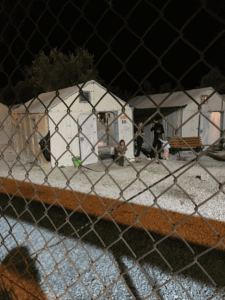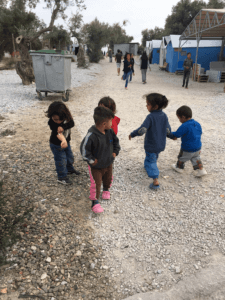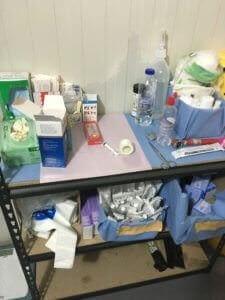Suzi Ehtesham-Zadeh
Woodstock, Georgia, United States
 |
| The refugee camp at night |
The pounding in Amana’s temples will not let up and is beginning to scare her. She has had headaches before, but this is different—it feels like something foreign has invaded her body and is occupying every square inch of it, from the tips of her fingers, which won’t stop tingling, to the pit of her stomach, which feels as if it is being twisted and kneaded like bread dough.
Maybe the pounding and tingling will subside if she takes a walk. Since she arrived in the camp she has been longing to go out to its far edge, the part that hangs over the water. If she keeps her head down as she walks, she can avoid eye contact with the other refugees crossing her path. She is not ready to communicate with anyone yet.
It is only Amana’s third day at the camp. So far she has been lucky enough to sleep in a tent by herself, even though the camp is overcrowded and she has seen whole families sleeping on the bare ground wrapped in nothing but blankets. The Farsi interpreter at the registry, an older woman, told Amana that she would be given a single tent for a few days until they could find a family to lodge with her. This, the woman told her, was because Amana was ghabeleh-hamleh—open to attack. At first Amana was insulted—to call her ghabeleh-hamleh was to suggest she was weak. But then the interpreter went on to explain, “It’s because you’re a young, single woman, and are here alone.” She lowered her voice and added, “It’s better for you if they label you this way. You will have more comfortable accommodations, and they might process your paperwork faster.”
When Amana steps out of her tent the sky is overcast and there is a strong wind. She passes through row after row of tents, crosses the empty lot at the center of the camp, and reaches the promontory—the only side of the camp not enclosed by chicken wire. The wind whips at her headscarf and billows her skirt, but the cold air against her face feels good. She sits with her back against a boulder and squints across the water at the shoreline in the distance. This, she knows, is Turkey, where she boarded an overcrowded raft just a few days ago and made the terrifying journey across the sea. In the past few days, whenever she has thought back on this journey, she has been unable to stop reliving one moment of it: the moment when a dark object fell out of the raft and sank beneath the surface of the water. She had closed her eyes and ears at the time and convinced herself that it was a backpack that had fallen, and she convinces herself again now.
 |
| Refugee children bond together inside the camp |
In her peripheral vision, Amana can see another figure sitting on a boulder to her left. The words ghabeleh-hamleh leap into her mind. There is no one else here but the two of them, and she is indeed open to attack. But when she musters her courage and turns to look at the figure, she realizes it is a child. She recognizes him: she has seen the boy repeatedly over the past three days. Every time she has seen him he has been alone, and Amana knows this means he has made the journey to the camp without his family. He cannot be more than nine or ten years old.
The boy’s face is turned away from her, but she recreates in her mind’s eye his beautiful, unmistakably Afghan features: the mop of dark hair, the slanted eyes rimmed with long lashes, the high cheekbones. He wears rubber slippers several sizes too big for him, and his jacket is too small. His eyes are fixed on the sea, and Amana pictures him standing on the shores of Turkey alone and terrified, squeezed into a vessel carrying three times more people than it is designed to carry, not having anyone to comfort him when the dinghy pitches and tosses in the choppy water.
Her impulse is to go over and talk to the boy, but she decides against it. She does not want to frighten him. She will return to the camp and leave him alone with his thoughts. As she passes by him, she whispers “salaam alaikum.” The boy does not answer but turns to her, and there is a moment of understanding—perhaps even a faint smile.
When she gets back to the camp she realizes she has missed lunch. It is a mistake to skip a meal in the camp, because there will be no food until the next meal. She knows that hunger will only increase the pounding in her temples and the prickling sensations now extending to her toes—but it is a relief not to have to stand in the food line. There are always large groups of Syrians in the line, and they make Amana uncomfortable—they greatly outnumber the other refugees at the camp, and this gives them too much power. The African refugees scare her, with their dark, lean bodies and their furtive movements. The Pakistanis are secretive. The Kurds are proud. As for the other Afghans, they have ignored her so far. Amana knows that rumors are already circulating about her.
She will not find any food for several hours, but must deal with the beast inside her that has taken hold of her lungs and makes it difficult to breathe. She has a dull ache in her chest and her throat is closing up. Some cold water on her face may help. This means that she must go to the latrine.
Since she has been in this camp Amana has learned to shut down her sense of smell, otherwise she would not be able to tolerate the fetid odor that hangs permanently in the air. She has seen men in bright yellow vests lazily sweeping certain areas of the camp, collecting only the largest pieces of garbage and pushing the smaller pieces further and further into the corners until they cannot be retrieved and are left there to rot. The latrine is cleaned every day with a hose, but the swill running from beneath has nowhere to go; it gathers in puddles and the dirt eventually absorbs it.
 |
| Physician’s table inside the clinic |
Just outside the latrine, she suddenly feels light-headed. Her legs give way and she falls to the ground. When she comes to, an aid worker is bending over her, her face so close that Amana can see her pores. A few seconds later she feels hands beneath each of her armpits hoisting her to her feet. She glances down and sees her headscarf lying in the dirt. The aid worker stoops to retrieve the scarf and places it in Amana’s hands.
The women steer her toward the clinic. She feels her legs beginning to buckle again, but as soon as she is inside the doctor approaches her and eases her into a chair. He is an older man, perhaps the age of her father, his round belly visible beneath his white doctor’s uniform. She has never been touched by a male who was not a family member, but is not afraid to let this man examine her. She does not resist when he puts his fingers against her face and pulls back her eyelids, when he lifts her headscarf and moves his fingers up and down her neck, even when he pushes back the neckline of her shirt and places a cold metal gadget against her chest right above the curve of her breast. She complies when he asks her to pull up her sleeve, and helps him slide the cuff around the bare flesh of her upper arm.
A look of alarm crosses the doctor’s face when he studies the number on the dial. He turns toward Amana and addresses her directly, even though he knows she cannot understand the words he is speaking. The interpreter translates: “You are too young to have such high blood pressure. You are having a panic attack.”
The doctor disappears into the back room of the clinic and returns with two small white pills in his hand. The nurse fills a plastic cup with water and tells Amana to take the pills. “These are tranquilizers,” she says. “They will help you to relax, which is what you need most right now. Tonight you must sleep, and tomorrow you must come back to check your blood pressure again.”
Dark clouds are gathering in the sky as Amana leaves the clinic. She is too drowsy to wait in the line for the evening meal, but walks slowly to her tent, falls onto her pallet, pulls the blanket around her, and sleeps.
She is awakened a few hours later by explosions in the sky. Her first thought is that the camp is under attack. She waits for the next explosion to come, and when it does she is relieved—almost amused—by her mistake. Sharp flashes of lightning can be seen through the canvas of the tent, and the wind is so fierce that the structure is threatening to collapse. The rain is seeping through the seams of the tent, soaking the ground beneath her pallet. She cocoons herself inside her blanket and before long drifts off to sleep again.
The next time she awakens to a rustling inside her tent. Some creature—maybe a rat—has found its way inside. Whatever it is, she decides it will not harm her; it is just seeking shelter from the storm. But when she feels it pawing at her blanket, she stiffens. Just as she is lifting her arms to bat the creature away, there is a sensation of warm breath against her cheek, followed by the sound of panting. Human breath and human panting.
Ghabeleh–hamleh. The words begin to echo in her mind. But then, a flash of lightning illuminates the face of her invader, his high cheekbones, his slanted eyes, and his mop of hair. She raises the edge of the blanket to make room for the boy, then hugs his body to hers and strokes his tear-drenched face with her fingers.
SUZI EHTESHAM-ZADEH is a bit of a cultural chameleon. The daughter of an Iranian physician and an American schoolteacher, she was born in Washington, D.C., came of age in Iran during the Shah’s era, moved to the United States to attend university, and later spent large chunks of her life in Europe. She holds a BA in Philosophy from Stanford University and an MFA from Boston University. A career English teacher who has taught on four continents, she has dabbled in writing and translation for many years. This story was inspired by her experiences as a volunteer Farsi interpreter in Lesvos, Greece.
Highlighted in Frontispiece Volume 10, Issue 3– Summer 2018
Fall 2017 | Sections | Fiction

Leave a Reply